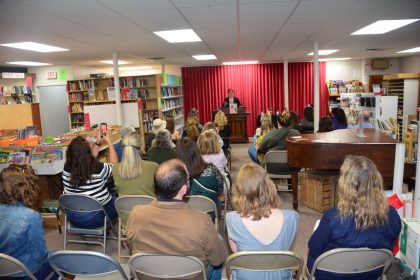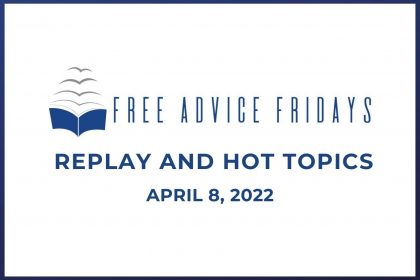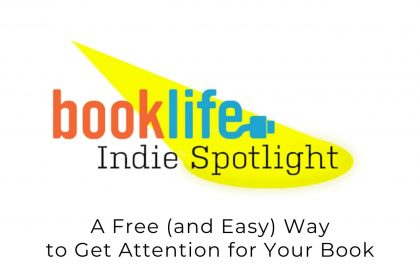
Even after years slogging through the swamp of freelance writing, I’m still challenged by the process of marketing. I started with nonfiction articles, progressed to a handbook, and now concentrate on fiction. The marketplace for publishing is crowded with hundreds of thousands of books, all screaming for readers’ attention.
Marketing takes about fifty percent of a creator’s time, an artist once told me. Other experts ballpark the time at one-third of the hours you spend writing. In any case, writing a book is only the first step. Once you sign with a publisher or decide to self-publish, you can be sure your workload will skyrocket.
Over the decades, I’ve seen the marketing landscape change from definite targets—newspapers, publications, posters in high-traffic areas, announcements on radio and television—to the internet and electronics. Connecting to these, using them, is a new game for me. I’ve started comparing my process to competing in an obstacle course.
“Obstacles are those frightful things you see when you take your eyes off your goals,” said Henry Ford. An obstacle course requires the competitor to have a versatile skill set of strength, endurance, and speed. In addition to developing the skills, I have to be willing to take risks, use my brain, and set priorities. The most basic tenet of marketing still applies. Fill the market’s needs.
Determine your writing genre to reach potential readers with similar interests.
What type of tales do you enjoy? In your heart have you always wished you could be a cowboy? A spy? A sexy lover? Are you still a child? Somewhat intellectual? If so, you probably read and write in a genre like children’s books, westerns, mystery, romance, or literary. Publishing is defined by specialized categories of books, which also identify readers by age, gender, interest, locale. The process helps greatly in marketing books as you try to ensure readership.
Determining a genre enables you to take the next step: locating people who specialize in the genre who might spread the news about your work. This means an internet search. My new novel, Never Retreat, Imajin Books, is women’s fiction of the light romance variety, so I sifted through hundreds of book bloggers and review sites on that topic. There are some sites that centralize many bloggers for easy access.
Two of them are:
Book Blogger Listing https://bookbloggerlist.com/submit-listing/
Book Blogger List http://bookbloggerlist.com/
Each blogger has his or her own requirements. Most expect an advance reader copy (also known as an ARC) as well as organized details (fact sheet anyone?), a cover image, author’s image, author’s biography, a book overview or blurb, and publication information. I don’t bother approaching mystery bloggers or cookbook sites because I know they won’t be interested in my work. I’m also spreading out my promotion over the period of several weeks, scheduling blog submissions according to the blogger’s needs and deadline.
Another decision: don’t get discouraged by the sheer volume of potential sites.
As I faced literally hundreds upon hundreds, my enthusiasm dissipated to intense depression. Then I recalled the words of Edward Everett Hale.
“I cannot do everything, but I can do something. And I will not let what I cannot do interfere with what I can do.”
I vaulted right into the heap of options. To evaluate what ones to approach, my publisher suggested looking at numbers of comments on a blogger’s site. More comments equal more readers of the blog.
Review sites also exist, some of them free, many of them paid.
The really big reviewers, like Library Journal or Publisher’s Weekly, may be obstacles to go around. They rarely take small or independent publishers’ products, and I believe they’re not worth chasing. If you’re lucky enough to have local media that still carries book reviews, don’t overlook this blessing. You can spend a fortune tracking down review sites that charge. If you have the time, inclination, and money, you might try a few at a time, tracking numbers of sales after each paid review as an evaluation.
The line between blogs and reviews is hazy in my mind, like trying to decide which lane to select in a footrace, but it’s worth a search for the more specialized areas. Again, genre is a good place to start, and there are sites that aggregate other review sites. For example, mystery writers can visit L. J. Sellers pages to find a list that will reduce your hours of research (also known as “training”). Be aware that many review sites want a pitch and ARCs up to four months in advance.
If you’re small, you’ve got to be tough and creative.
Mull over your “race” strategy, even considering off-the-wall ideas. Here are some I’ve thought of:
- Send notices to every group I’m affiliated with and ask them to put a notice about my book in their newsletter, FaceBook or elist. Yes, I’ll send to my local romance group. But I’ll also see if my city councilman’s monthly news would carry my information.
- Tailor the notice to the group’s interest. My city councilman features local businesses and interesting people. I qualify as both. I don’t expect him to simply run a puff-piece. I’ll insert a hook that applies to the neighborhood.
- Social media, social media, social media. I get sick of 20 tweets a day from the same author with a new release. However, I’ve had to resign myself to some social media. An author’s Facebook page is free, as are several popular social media sites. If you’re new to the game, try just a few at first.
- Give-aways and contests are popular with romance authors. I’m still feeling my way, so I haven’t done much of this. You might start with Good Reads give-aways because they’re easy enough that I’ve done them.
- Ask friends and connections to push your book on their social media. Be sure to provide ready-made news release and publication information.
In the obstacle race of book marketing, your sustenance for energy and strength isn’t snacks and chocolate but the emotional equivalent. Surround yourself with supporters, cheerleaders, enthusiastic fans. Recite encouraging quotes like “never give up” or “I think I can.” Use prayer, chants, spells, and favorite songs. Whatever helps you. In any case, drop those detractors and nay-sayers who only bring you down. Like an armchair quarterback who’s never played a football game, these folks are always ready to criticize and do you no good. You can reserve their analyses for a later time when you’re in the evaluation stage of your entire race.
“The greater the obstacle, the more glory in overcoming it.” — Moliere.
If you’re ready, take your position. On your mark, get set, go!
Bonnie McCune’s newest book is Never Retreat. A feisty single mom clashes with an ex-military, macho corporate star at a business retreat in the wild Colorado mountains, where only one can win a huge prize. But when a massive flood imperils their love and survival, they learn the meaning of true partnership.
Bonnie McCune has been writing since age ten, when she submitted a poem about rain rushing down the gutter to the Saturday Evening Post. (It was immediately rejected.) This interest facilitated her career in nonprofits doing public and community relations and marketing. She’s worked for libraries, directed a small arts organization, and managed Denver's beautification program.
Simultaneously, she’s been a freelance writer with publications in local, regional, and specialty publications for news and features. Her civic involvement includes grass-roots organizations, political campaigns, writers' and arts' groups, and children's literacy. For years, she entered recipe contests and was a finalist once to the Pillsbury Bake Off. A special love is live theater. Had she been nine inches taller and thirty pounds lighter, she might have been an actress.
Her true passion is fiction, and her pieces have won several awards. Never Retreat is her third novel and her fifth book of fiction. For reasons unknown (an unacknowledged optimism?), she believes one person can make a difference in this world.
Visit her at www.BonnieMcCune.com, Bonnie@BonnieMcCune.com, twitter.com/bonniemccune, facebook.com/authorBonnieMcCune, www.linkedin.com/in/BonnieMcCune.









Nice article and thanks for sharing. I have a question.
What sources, groups or organizations have you seen for author’s who may have published in the academic space?
Most articles I see that have been written are for romance witter, mystery writers, memoir writers and so on.
But what if you wrote a history or reference style book. How do you research or find bloggers / reviewers or sources for that particular genre and space?
I’ve look, but maybe not in the right place. Libraries are one thought, but what would be others?
Have a great day.
David
Google is our friend. Search for blogs on your topic – or who share a common goal, like historical preservation. Here is are two lists I found that could get you started.
1. https://www.nps.gov/subjects/nationalregister/state-historic-preservation-offices.htm
2. https://www.npi.org/blogs
Can you pitch articles to these places and use guest blogging as a way to market your book?
You might have to look harder, but behind every book topic – fiction or non-fiction – there is a group of people who are interested in and talk about the topic. Start by finding “your” people.